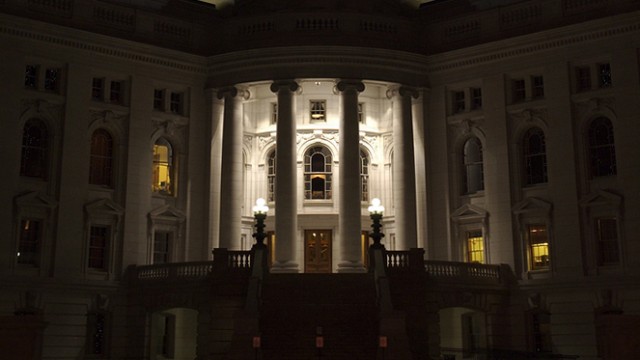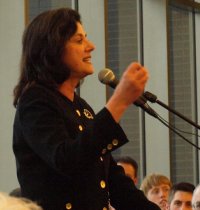
Last week, The Center for Media and Democracy (CMD) filed suit against Wisconsin State Senator Leah Vukmir for failing to release documents as required under the state’s public records law. CMD alleges that Sen. Vukmir possesses materials pertaining to her involvement with the American Legislative Exchange Council (ALEC), the controversial organization of which she is a member. Sen. Vukmir has handed over ALEC-related documents in the past, but recently, reports CMD, the senator’s responses to records requests have “dried-up.”
ALEC may have something to do with that.
A little background for the uninitiated: ALEC calls itself a “nonpartisan” public-private partnership of state legislators and corporations, who gather regularly to produce what they term “model legislation” behind closed doors. The goal is for ALEC member legislators to get versions of those model bills passed in their statehouses.
Wisconsin’s state government has thick-roped ties to ALEC. Nearly one-third of its legislators are ALEC members, and versions of ALEC model bills have wended their way through many a legislative session. (Last week, I wrote about Wisconsin’s curiously high ranking in an ALEC “economic outlook” report.) But the state also has a comprehensive open records law, declaring that “all persons are entitled to the greatest possible information regarding the affairs of government and the official acts of those officers and employees who represent them.”

Leah Vukmir (Wikimedia Commons)
When I called Vukmir’s office, they refused to comment about the lawsuit.
Vukmir’s assertion that she has no pertinent ALEC documents comes at an interesting moment. Lately, the organization has undertaken an effort to stop its documents from falling into outside hands, most notably with an imprint that has begun to grace the bottom of ALEC materials. “Because this is an internal ALEC document,” the disclaimer reads, “ALEC believes it is not subject to disclosure under any state Freedom of Information or Public Records Act.”
What’s more interesting, the new imprint emerges in the midst of an ALEC image revamp. “We really believe in transparency,” ALEC spokesman Bill Meierling told The Huffington Post back in March. “We believe that more eyes on our model policies will create better policies. We are hoping to engage with the public.” Though ALEC now posts all of its model legislation online (“If it is not on our website,” said Mieirling, “it is not our policy”) its full corporate and legislative membership lists still remain hidden from public view.
The suit against Sen. Vukmir isn’t the first time an ALEC legislator has come up against CMD. In October, the center (in conjunction with Common Cause) reached a settlement with five Wisconsin lawmakers who then released their ALEC-related emails. But the recent drama over email correspondence seems to have made ALEC all the more tech- savvy. In what CMD construes as an effort to skirt state open records laws, ALEC has begun to distribute materials using the internet drop box website Box.com, which allows ALEC members to share materials via hyperlink to ALEC-related content, rather than directly sharing the content itself. Anyone who is sent a link to a Box.com folder must have a password-protected account to access those files – and even then, a file’s “owner” retains the option of removing, altering or setting expiration dates for all files in question.
According to the Wisconsin State Journal, Michael Bowman – ALEC’s senior director of policy and strategic initiatives – said the drop box system was implemented when an attorney advised that those files wouldn’t be subject to public records laws. Bowman also claimed to be under the impression that the organization’s new non-disclosure imprint was legally valid in all 50 states.
But Wisconsin Freedom of Information Council president Bill Leuders told the Journal he finds such claims absurd. “The logic of our open records law is that if the government has documents in its possession as it goes about doing the government’s business, the public is entitled to obtain those documents,” he said.
The situation is not without irony. CMD’s Brendan Fischer notes that in a statement put forth by a 2002 “ALEC Issue Analysis,” the group states that “Transparency is a bulwark of constitutional republicanism: citizens cannot inform themselves on the issues of government if they cannot see what the government is doing. Thus, transparency serves as an important feedback mechanism by allowing the citizens to monitor and more accurately select their representatives.”
It seems ALEC’s new cellophane image does not come without wrinkles. But if suits like the one Sen. Vukmir is now facing continue to occur, the group may need to reconsider its definition of transparency.
 |
Laura Macomber is an associate producer at Okapi Productions. She is a former employee of Newsweek & The Daily Beast, where she produced news stories for the company’s live journalism events, Women in the World and The Hero Summit. |


